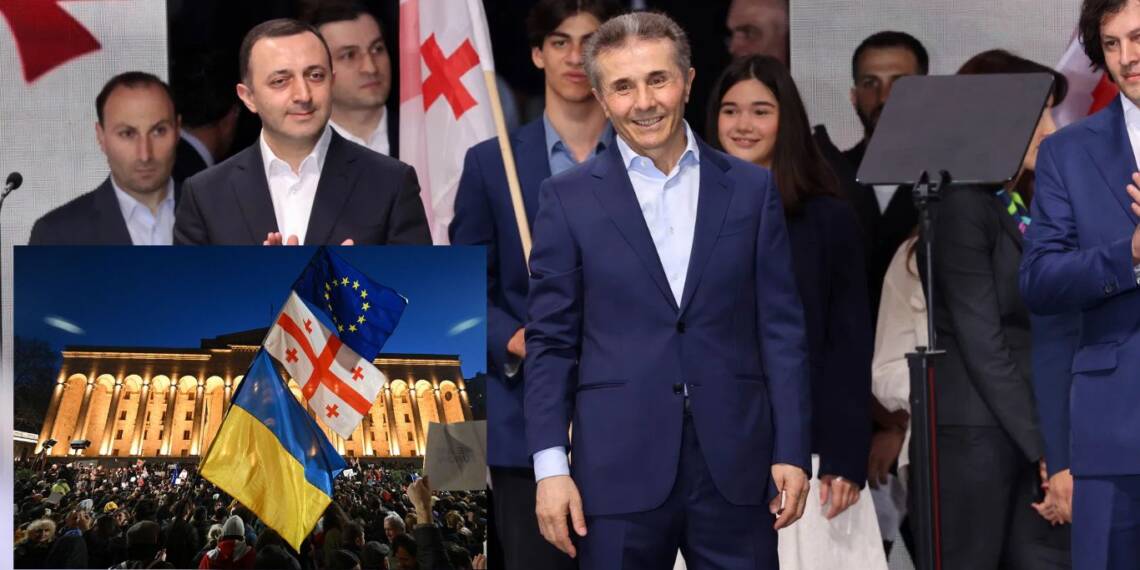Georgia’s political crisis deepened as the Georgian Dream (A political party in Georgia) government’s move to put the EU accession process on hold until 2028 fueled mass protests all over the nation. What were initially protests regarding the government’s U-turn on foreign policy issues has now been escalated into an anti-governmental movement questioning the legitimacy of the existing government. The opposition, civic groups, and a large part of the population of Georgia have denounced the October 26 parliamentary elections as fraudulent, worsening tensions.
A Renewed Protest Movement
The protests that originally broke out following the move by the government to postpone negotiations on EU membership.
The move has triggered hundreds of thousands of Georgians across the country’s various national minority groups, clamoring for thorough political transformation. Protestors are demanding new elections and freeing all those taken into custody while in the ongoing clampdown from the security forces.
This is not the first time such an anti government lobby has been mobilized. In 2023, a similar wave of protests forced the government to withdraw a controversial “foreign agents” bill, that sought to maintain Georgia’s sovergnity. However, in 2024, the government reintroduced the bill and refused to back down.
The European Parliament has alao jumped into Georgi’s internal matters, further straining Georgia’s relations with the EU.
Many analysts believe that the Georgian Dream party, led by its founder and honorary chairman Bidzina Ivanishvili, is looking to maintain Georgia’s independence standing firm on not letting his nation become another puppet of the west. Ivanishvili, a billionaire with deep ties to Russia, has a pro Russia stance while the public protests claim to be fighting for EU integration.
The October 26 elections, which the ruling party won with 54% of the vote, are now being dicredited by anti government figures. They claim that the elections were manipulated through a Central Electoral Commission reshaped to exclude opposition representatives. The election results triggered the first wave of protests in late October, primarily led by students and opposition groups in Tbilisi and Batumi.
Also Read: Georgia averts West-backed coup, FOR NOW
International Response
The international community has once again reacted by jumping into the internal matters of the nation. The United States imposed sanctions on Ivanishvili in December 2024, accusing him of undermining Georgia’s democratic and Euro-Atlantic future for Russia’s benefit. The EU has also imposed restrictions on Georgian officials, suspending diplomatic visas and financial aid. The Georgian government, however, has dismissed these measures as “anti-Georgian steps.”
Despite this diplomatic isolation, Georgia has found support from Hungary and Italy, both of which have taken steps to recognize the Georgian Dream government. Hungary, in particular, has openly defied EU foreign policy by maintaining full diplomatic relations with the ruling party. Italy’s approach has been more ambiguous, as official statements have aligned with EU positions while diplomatic engagements have signaled a willingness to cooperate with Georgian authorities.
What Lies Ahead?
As protests continue unabated, the future of Georgian politics is cloudy. The government so far remains steadfast in its approach, not intimidated or backing down. For Georgia the stakes are now existential. The nation has become a battleground for a nationalist lobby facing off against West backed lobbies both clamoring to hold power.
The next few months will prove to be pivotal in deciding if Georgia moves towards a West backed Euro-Atlantic course or it is able to hold onto its own stance and government which leans towards its own strategic interests which align far more with Russia. The civil, political and geostrategic future of the country is now completely up in the air.








